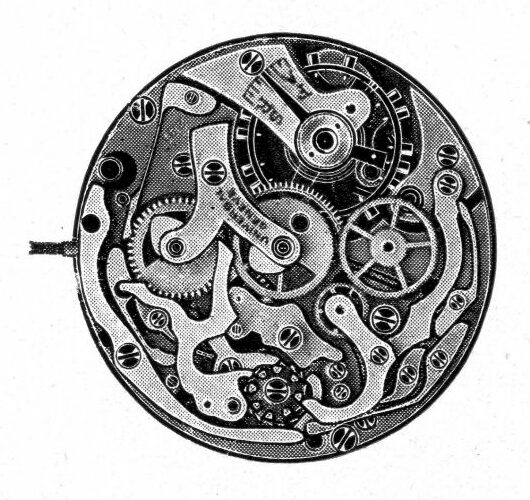The “Compax” or “Bi-Compax” version of Universal Cal. 281 is a hand-winding chronograph movement with hour and minute registers.
Many of the Universal Cal. 281 family were produced in different versions: The basic “Compur” or “Uni-Compax” movement features only a 30 or 45 minute chronograph counter and small seconds with two subdials, the “Compax” or “Bi-Compax” version adds a 12 hour counter with three subdials, and the “Tri-Compax” includes a full calendar and moon phase with four subdials. The “Compax” naming scheme is often confused today, with two-subdial versions often called “bi-compax” and three-subdial configurations “tri-compax” even though this is incorrect.
All Universal movements were produced in the Pellaton family factory in Les Ponts-de-Martel near Le Locle in Canton Neuchâtel. As of 1942, Universal president Raoul Pellaton was president of the company, and the factory bore the name “Universal”, but it remained an independent business. After Universal divested from the factory in the 1950s, Zenith purchased it.
Universal was also unusual in using the same name for movements with various complications. There were only three basic movements in the “golden age” Universal chronograph family: Cal. 281 (12”’ and larger), Cal. 285 (14”’ and larger), and Cal. 289 (10.5”’). Larger-diameter versions of each were numbered differently (e.g. 281, 381, 283, 383, 481) regardless of whether they featured a minute totalizer only (“Uni-Compax” of “X”), an hour counter (“Compax” or “AX”), a date (“Dato-Compax” or “DX”), or a full calendar (“Tri-Compax” or “TX”). The calibre number corresponds only to the diameter and hairspring used.
| Breguet Hairspring | Flat Hairspring | |
|---|---|---|
| 12”’ (27.80 mm) | Universal 281 Uni-Compax Universal 281 Compax Universal 281 Tri-Compax | Universal 381 |
| 12.25”’ | Universal 282 | |
| 13”’ (29.50 mm) | Universal 283 | Universal 383 |
| 13.5”’ | Universal 284 | |
| 14”’ (31.70 mm) | Universal 481 |
